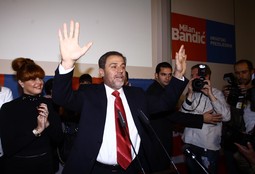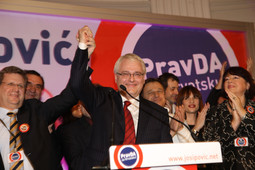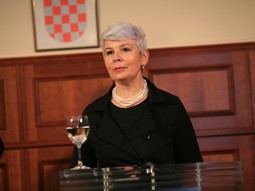Published in Nacional number 737, 2009-12-29
POLITICAL REPORT
HDZ to decide Bandic's fate
IVO JOSIPOVIC won more than twice as many votes in the first round of the presidential elections than the second-placed candidate – meaning that Milan Bandic is going to have to launch a very tough campaign
 A FRESH START TO THE CAMPAIGN A few minutes after the results of the election were declared Milan Bandic started campaigning in an effort to win over the votes of the political right
A few minutes after midnight, 28 December, after the national election commission announced the results of the first round of the elections, Milan Bandic launched his campaign to win the support of right-wing voters. Considering the large lead of the SDP candidate Ivo Josipovic, Bandic's chances are pretty modest, but the continuation of the campaign will be much tougher than it has been so far.
A FRESH START TO THE CAMPAIGN A few minutes after the results of the election were declared Milan Bandic started campaigning in an effort to win over the votes of the political right
A few minutes after midnight, 28 December, after the national election commission announced the results of the first round of the elections, Milan Bandic launched his campaign to win the support of right-wing voters. Considering the large lead of the SDP candidate Ivo Josipovic, Bandic's chances are pretty modest, but the continuation of the campaign will be much tougher than it has been so far.
To gain ground on Josipovic, the Mayor of Zagreb has to pick up the votes of the HDZ, right-wing candidates, and to get those who missed the first round out to the polls. In any case a very tough mission, but, as they have concluded in the Josipovic election camp, these elections are far from won. Josipovic won 32.4 percent, i.e. 640,000 votes, while Milan Bandic took 14.8 percent, i.e. 293,000 votes, and what follows now is the phase of the campaign in which both candidates will try to win over as many of the people that voted for the other candidates as they can. Josipovic can be very confident in the support of the 7.3 percent of voters (143,000) that cast their ballot in favour of Vesna Pusic and the 3.9 percent (76,000) that gave their vote to Damir Kajin. With these votes Josipovic wins about 43.5 percent, i.e. 850,000 votes.
And while the HNS and IDS parties did not immediately after the results were announced suggest to their supporters that they vote for the Social Democrat Party candidate in the run-off round, it is a logical outcome. Much less so because Vesna Pusic and Damir Kajin overly value Josipovic's qualities as a politician (the HNS and IDS consider him wishy-washy and are not overly enthused about his political positions), but more so because Milan Bandic has for years been the person most vehemently stigmatised by these parties. Besides, the HNS has on several occasions made a coalition with the SDP conditional on eliminating Bandic from the elections slates.
Bandic faces a much tougher job in trying to draw all other voters to his side. Regarded rationally, his chances are slim, but knowing Bandic's energy it is not to be expected that he will give up right away. He will very likely pick up most of the 120,000 votes that backed right-wing candidates Josip Jurcevic, Boris Miksic and Miroslav Tudjman. These voters will certainly not give their votes to the SDP's presidential candidate Josipovic, and for Bandic the key question is how to even convince them to vote, because about 9 percent of the vote is at stake.
 LEFT CALCULATIONS In the run-off round Ivo Josipovic has, with the votes won by Vesna Pusic and Damir Kajin, 43 percent of the vote – and needs a part of the Vidosevic and Primorac vote to win
A much greater goal for Bandic is to attract the majority of votes that went to Andrija Hebrang. The Croatian Democratic Union (HDZ) candidate won 12 percent of the vote, and some election campaign polls have shown that Bandic can count on a large slice of these votes. According to a poll released on 22 December by Nova TV, about 75 percent of Hebrang's voters said they were willing to vote for Bandic in the run-off round. If that is the case - and the forecasts of Nova TV have so far been quite precise - that is a further 8 to 9 percent for Josipovic's opponent in the run-off round.
LEFT CALCULATIONS In the run-off round Ivo Josipovic has, with the votes won by Vesna Pusic and Damir Kajin, 43 percent of the vote – and needs a part of the Vidosevic and Primorac vote to win
A much greater goal for Bandic is to attract the majority of votes that went to Andrija Hebrang. The Croatian Democratic Union (HDZ) candidate won 12 percent of the vote, and some election campaign polls have shown that Bandic can count on a large slice of these votes. According to a poll released on 22 December by Nova TV, about 75 percent of Hebrang's voters said they were willing to vote for Bandic in the run-off round. If that is the case - and the forecasts of Nova TV have so far been quite precise - that is a further 8 to 9 percent for Josipovic's opponent in the run-off round.
If he wants these votes, Bandic is going to have to very much radicalise the remainder of the campaign. So far he has for the most part avoided conflict, did not level accusations against his opponents, making an effort even not to criticise Zoran Milanovic and has led a positive campaign. But his transformation from a former member of the SDP into a presidential candidate with strong ties to the Catholic Church and advocates of national and traditional values is evident. Besides, Bandic has rallied to his side a group of several dozen former wartime commanders and intelligence community officials, led by Miodrag Demo, Miro Laco and Mirko Ljubicic Sveps. Their mission is to garner the support of a part of the war vets population and their families, and the voters in Bosnia & Herzegovina. The fact that he won twice as many votes as did Hebrang in the neighbouring country confirms that they are well organised.
And while Jadranka Kosor has confirmed officially that the HDZ would not be making an official endorsement of any one candidate in the second round, it is quite understandable that it would suit the ruling party much more if Bandic were to win rather than Josipovic, who is the SDP nominee. A Bandic triumph would, besides, cause no end of strife within the SDP, and that would certainly work in the HDZ's favour. That is why a, at the least, discreet support of the Bandic campaign is to be expected, although the HDZ will be careful not to make it overly obvious. Josipovic's advantage is hard to catch and it would not at all suit Jadranka Kosor to provoke a dispute with the favoured candidate over Bandic. But she is also certain not to call on HDZ voters to refrain from going to the polls in the run-off round.
Bandic can pick up some more votes in Bosnia & Herzegovina, where in the first round he won 48 percent of the vote, while Josipovic only picked up 5 percent. If Bandic's aides succeed in animating the local Croatian communities' voters to go to the polls, at least as many as the HDZ managed to turn out at the 2005 presidential elections, when 100,000 people voted in the Diaspora, that could secure Milan Bandic a further 4 to 5 percent. The problem with the "Diaspora" is that it could provoke a reaction among voters in Croatia, among which the majority do not want people living abroad to decide, as a result of which an additional part of the local population could cast their vote for Josipovic.
Bandic also needs the votes of Nadan Vidosevic and Dragan Primorac, who together won a little over 16 percent of the vote, but it is an open question as to how much actual support he has among these voters. The survey carried out by Nova TV shows that Vidosevic's and Primorac's voters are about equally willing to vote for Bandic or Josipovic in the run-off round, and that certainly suits the one with the advantage more. If the votes were to be automatically halved like that, it would turn out that Josipovic could count on about 60 percent of the popular vote, and Bandic on about 40 percent. Bandic will certainly also do his best to motivate a part of the 56 percent of registered voters who did not come out to the polls in the first round. And besides, in Zagreb and Split he achieved a truly catastrophic showing.
As the Mayor of Zagreb he won barely 15 percent of the popular vote (Josipovic took 34 percent), but what is particularly bad for him is how Zagreb voted. Back at the May local elections 146,000 voted for Bandic to become Mayor, while this Sunday he only picked up 59,000 votes, or almost 2.5 times less. Percentage-wise he fared even worse in Split, with 8.5 percent, in Rijeka with a little over 6 percent and in Varazdin with 5 percent of the vote. Urban centres yield the highest number of votes, and that is where Bandic has fared unexpectedly poorly.
 JADRANKA KOSOR has announced that the HDZ would not pick favourites in the run-off round
By Monday he had been promised the support of Zeljko Kerum, who promised his cooperation in the rest of the campaign, and similar support is likely to come from some other mayors and local politicians. But this is help from those of a like political mind and from sympathisers, and what Bandic will need for a serious campaign is the support of some more relevant politicians and public figures with national recognition. Just how alone he is could be seen on the night of the elections, when only Vladimir Jordan, the former head of the Croatian Pensioners' Party, was the only better known figure to show up at his campaign headquarters. The remainder of Bandic's team are his long-time aides in Zagreb city hall, Dusko Ljustina, Pavle Kalinic, Jelena Pavicevic-Vukicevic, Davor Jelavic, and that is about it as far as the personnel potential he has at his disposal in this campaign.
JADRANKA KOSOR has announced that the HDZ would not pick favourites in the run-off round
By Monday he had been promised the support of Zeljko Kerum, who promised his cooperation in the rest of the campaign, and similar support is likely to come from some other mayors and local politicians. But this is help from those of a like political mind and from sympathisers, and what Bandic will need for a serious campaign is the support of some more relevant politicians and public figures with national recognition. Just how alone he is could be seen on the night of the elections, when only Vladimir Jordan, the former head of the Croatian Pensioners' Party, was the only better known figure to show up at his campaign headquarters. The remainder of Bandic's team are his long-time aides in Zagreb city hall, Dusko Ljustina, Pavle Kalinic, Jelena Pavicevic-Vukicevic, Davor Jelavic, and that is about it as far as the personnel potential he has at his disposal in this campaign.
That is why it is, from his point of view, a good decision to kick the campaign up a few notches and to censure Josipovic as a president for whom Zoran Milanovic would be calling the shots. Given the large lead Josipovic has over him, Bandic has nothing to lose. His relationship with the SDP has been entirely severed and over the coming two weeks the Mayor of Zagreb will become his former political party's greatest foe.
Some of his aides are going so far as to describe Josipovic as a "Yugoslav" off the record, which is a level of labelling that had disappeared from Croatian political life over the past years. But this vocabulary no doubt reflects the opinions of the right-leaning voting body, whose votes were scattered among four candidates in the first round.
It turns out then, in an effort to turn the situation to his advantage and to win the presidency, Milan Bandic, who recently pointed out that he created the SDP with Ivica Racan, is now trying to rally the political right wing.
Related articles
Josipovic off to Rome to meet with Benedict XVI
Croatian President Ivo Josipovic plans to visit the Vatican in October to meet with Pope Benedict XVI. Final arrangements are ongoing for a state… Više
Latest news
-
28.10.2010. / 14:15
'A profitable INA is in everyone's interest'
-
28.10.2010. / 09:38
Sanader’s eight fear SDP — Won’t bring down Government
-
21.10.2010. / 15:02
Interior Ministry turned a blind eye on Pukanic assassination
-
20.10.2010. / 09:34
Barisic could bankrupt HDZ




